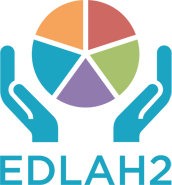EDLAH2
 |
2016-2018. A tablet providing to seniors all the information and support they need to live autonomously as long as possible. |
The EDLAH2 project aims to test and encourage usage of tablet technology with older people using the concept of gamification. This will be achieved by designing simplified screen layouts, with remotely managed configuration settings. Moreover, we will record activity and health parameters such as weight and blood pressure. Finally we will encourage social inclusion like photo sharing, wellbeing journal, healthcare articles with Q&A medication reminders and nutrition intake monitoring.
EDLAH2 is the evolution of the EDLAH project. EDLAH2 is an elderly friendly software to motivate older people on the one hand to stay in touch with the family and friends, on the other hand to stay active with modern technology. EDLAH2 aims to implement the suggestions made to us by our enthusiastic trialists by creating a set of tailored applications and utilizing gamification as a glue that ties together all the elements that compose this service.

Gamification is the concept of applying game mechanics and game design techniques to engage and motivate people to achieve their goals. Gamification taps into the basic desires and needs of the users impulses which revolve around the idea of status and achievement.
The Gamification Centre will enable all modules developed in EDLAH2 to be more appealing, attractive and have a greater incentive to be used. This motivational surplus will potentially provide for better personal mental health, personal physical health, social integration, self-esteem etc. In short all the life essential modules implemented in EDLAH2 will be improved by using psychologically proven gamification techniques. The basic psychological principle behind gamification is to provide positive reinforcement for each favored action taken. Generally, we respond to incentives and enjoy some sort of response or reward to our involvement. The idea is to bring an increased level of motivation, interest and engagement into areas that may be important but mundane. This results in a greater drive to be involved in this area of action and a positive feeling when rewards are achieved.
Our research methodology in EDLAH2 is to cover the use of tablets of the elderly in research collection on line. Then we intend to record their qualitative feedback and analyse it in order to give feedback to developers.
Our initial research will be to look for potential people to use gamification development and then look for possible profiles which will not respond to gamification. After that we will be able to give directions to the design of the platform where we will take into account the rewards, the motivation, the involvement of the family and the possible health and social improvement.

We have two different end user organisations involved in our project. Each of these will provide volunteers (who will have been asked to complete a consent form) in the target group (65-70) year olds, actively independent to engage at various trial stages throughout the project. This provides us a wide, cross (EU) community view of the needs of the end users, from the confidently independent to those with early cognitive degradation.
All end users will also be engaged via feedback questionnaires, workshops and the design teams will be available to them at all times. We have established this pattern during the original EDLAH project with great success, our end users becoming vitally engaged in the project and even driving us at times.
Expertise of TaM
As an expert in wearable technologies and sensor applications, TaM will be in charge of the development of the wearable activity monitor. TaM is currently testing different available wearable devices (Xiaomi Mi Band, Microsoft Band, Pebble) in order to pick the best one for the trials and the demands of the project.
The wearable activity monitor will monitor both sleep and physical activity. The target is not only to propose personalized physical activities at a specific time, but also to monitor and detect abnormal situations, such as sleep deprivation in order to point out and prevent potentially risky situations. We will set goals and achievements in line with realistic expectations for the older adult and importantly, providing a guide to their wellbeing improvement. We will be able to monitor activity and determine whether there is too little, too much or a significant event, in the activity pattern of the older adult. For example is the older persons sleep pattern altered? Have they used the bathroom more or less frequently? Are they staying in the same room longer than normal? When a change is detected, an alarm/alert can be activated. This could be a text, email to an informal carer or a ‘nudge’ to the older person in the form of a vibration through the device, a message on the tablet/device etc. Intelligent alerts will also be given i.e. if appropriate; using online weather information, propose a walk outside, on a sunny day, as an exercise opportunity.
Publications
- Enhance daily live and health of elderly people
- Adaptive power switching technique for ultrasonic motion sensors
- User Requirement Analysis for the Design of a Gamified Ambient Assisted Living Application
- Anomaly Detection Techniques in Mobile App Usage Data among Older Adults
